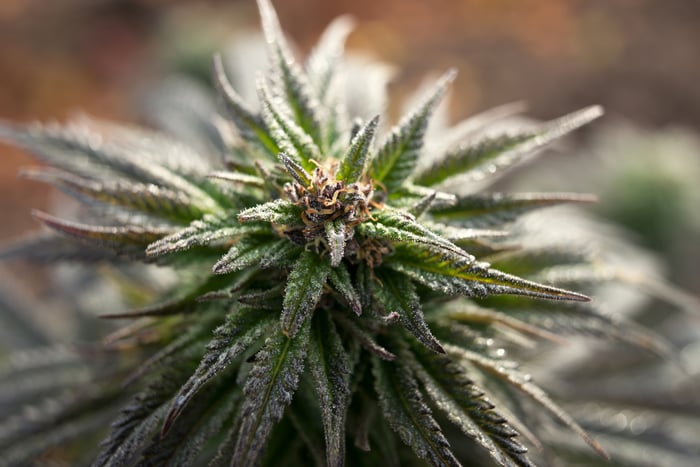For the past nine months, tech stocks have been all the rage. But while tech has Wall Street's attention, marijuana stocks have been quietly outperforming.
According to a recent report from New Frontier Data, the legal U.S. cannabis industry is expected to grow by a compound annual rate of 21% between 2019 and 2025. That will push legal weed sales from $13.2 billion in 2019 to an estimated $41.5 billion by mid-decade. This is a fast-growing industry with overwhelming support for legalization from the public, which is what makes it such an intriguing investment opportunity.
Every year brings change to the cannabis industry. As we ready to move into 2021, expect the following four trends to dominate the marijuana space.

Image source: Getty Images.
1. The push for cannabis banking reform
In November, the pot industry let out a collective cheer when Democratic Party challenger Joe Biden defeated incumbent Republican Donald Trump for the presidency. Although Trump has maintained a hands-off approach to state-level marijuana regulation, both of his attorneys general (Jeff Sessions and William Barr) were unabashedly anti-cannabis. Trump himself has shied away from the legalization debate.
On the campaign trail, Biden pledged to decriminalize marijuana at the federal level and reschedule the drug from Schedule I to Schedule II. Though this wouldn't legalize cannabis at the federal level, it would remove many of the penalties associated with marijuana use.
What'll be far more interesting is if progress is made on cannabis banking reform. The Democrat-led House has previously introduced legislation designed to allow banks and credit unions to provide basic financial services to pot companies in legalized states without the fear of a federal penalty. Momentum certainly seems to favor banking reform, but much will depend on whether Republican Senate Majority Leader Mitch McConnell allows such a bill to reach the upper house's floor for a vote.
The fight for banking reform is especially noteworthy for marijuana real estate investment trust Innovative Industrial Properties (IIPR -0.17%). Innovative Industrial's sale-leaseback program has been a critical growth tool for the company that cannabis banking reform would probably weaken.

Image source: Getty Images.
2. State-level legalizations
Even though it's an off year for elections, 2021 could see a handful of states move to legalize medical or recreational marijuana. On Dec. 28, I laid out my thinking on three states that looked poised to legalize in the upcoming year.
New York probably has the highest probability of legalizing adult-use weed in 2021 of any state. The Empire State's Legislature came very close to doing so in 2019. Legalization would likely have come in 2020 had the coronavirus disease 2019 (COVID-19) not hit New York so hard. With big budget gaps to fill, New York legislators might get to business on legalizing recreational pot early in 2021.
The neighboring state of Connecticut could also follow suit on the adult-use cannabis front. The November election further widened the margin by which Democrats control Connecticut's House and Senate, potentially paving the way for legalization. Favorability toward nationwide legalization in November's Gallup poll was 83% for self-identified Democrats, compared to 48% for Republicans.
Virginia is another strong candidate to legalize recreational pot. Democrat Gov. Ralph Northam has already released a comprehensive plan designed to legalize adult-use weed. Northam should find a receptive audience, with Democrats controlling Virginia's Legislature.

Image source: Getty Images.
3. The push to profitability
The upcoming year will also feature the ongoing push toward profitability by North American pot stocks. Though some marijuana stocks have already achieved recurring profitability, like the aforementioned Innovative Industrial Properties, the vast majority of pure-play pot stocks have yet to do so.
The expectation, based on Wall Street estimates, is that many of the largest publicly traded U.S. multistate operators (MSO) will turn the corner to recurring profitability in 2021. These include Green Thumb Industries, Cresco Labs, and Planet 13 Holdings (PLNH.F 1.35%), to name a few.
Planet 13 is an extremely intriguing case. Unlike other MSOs, which have expanded into a multitude of legalized states, it's focused on a small number of states. Right now, it has a single location open just west of the Las Vegas Strip in Nevada. This location spans 112,000 square feet and happens to be the largest dispensary in the country. In 2021, Planet 13 will open its second dispensary -- a 40,000-square-foot facility -- in Santa Ana, California, which is about 10 minutes north of Disneyland.
Meanwhile, most Canadian pot stocks are still trying to pare back expenses and look at least a year or two away from sustainable profitability. Aphria (APHA) might have been the one exception in the upcoming year. However, its merger with Tilray (TLRY) complicates matters and might push the company into the red for another year.

Image source: Getty Images.
4. An ongoing North American shakeout
Finally, look for the industry to continue to thin out as the gap between the haves and have-nots widens.
Although marijuana offers supercharged growth potential this decade, not every pot stock can be a winner. We've already seen plenty of industry hopefuls fall by the wayside. The question is: What other companies will be left in the dust?
For example, Tilray very much needed a partner given its precarious cash situation and ongoing operating losses. Merging with Aphria is a saving grace for Tilray and might give the combined company some operating leverage domestically and internationally years down the road.
However, this merger also complicates the situation for the struggling Aurora Cannabis (ACB -0.15%). Once viewed as a potential partner for Aphria, Aurora Cannabis now has no logical suitor. That's problematic given the company's precipitous cash burn and ongoing share-based dilution. Aurora doesn't have the look of being a long-term survivor in the cannabis space, at least at the moment.
In other words, 2021 could be a put up or shut up sort of year for fringe-level cannabis stocks like Aurora.





